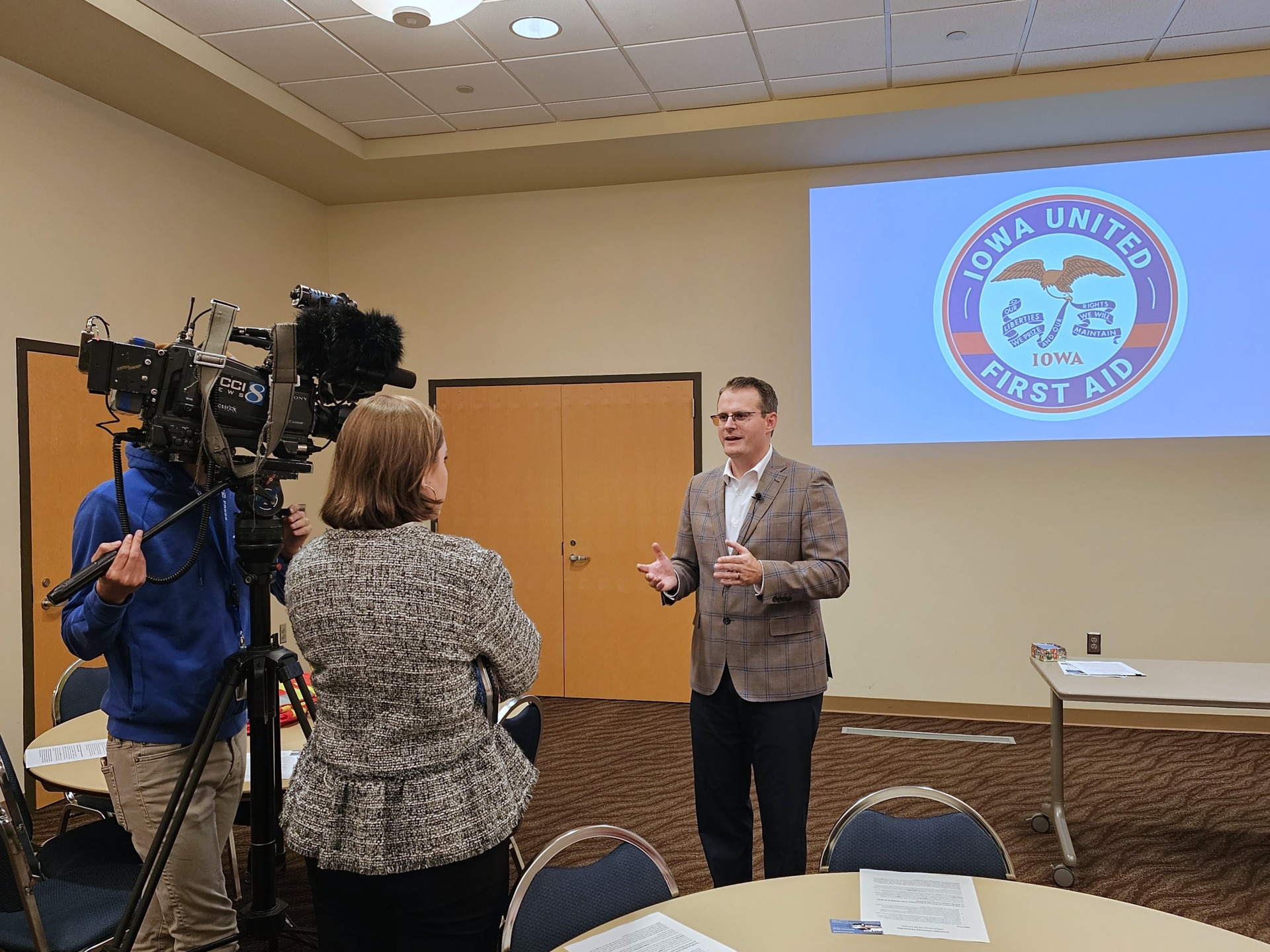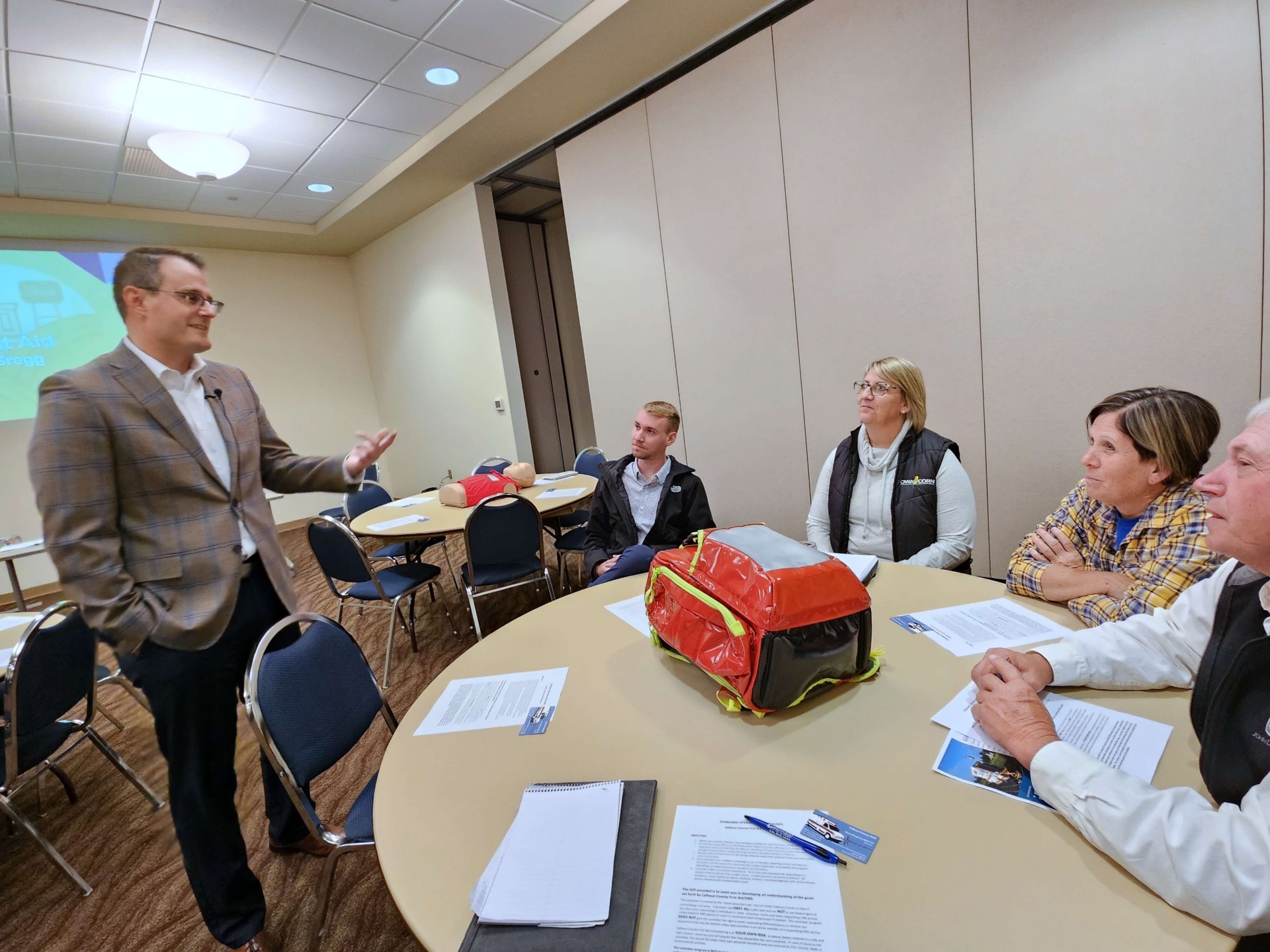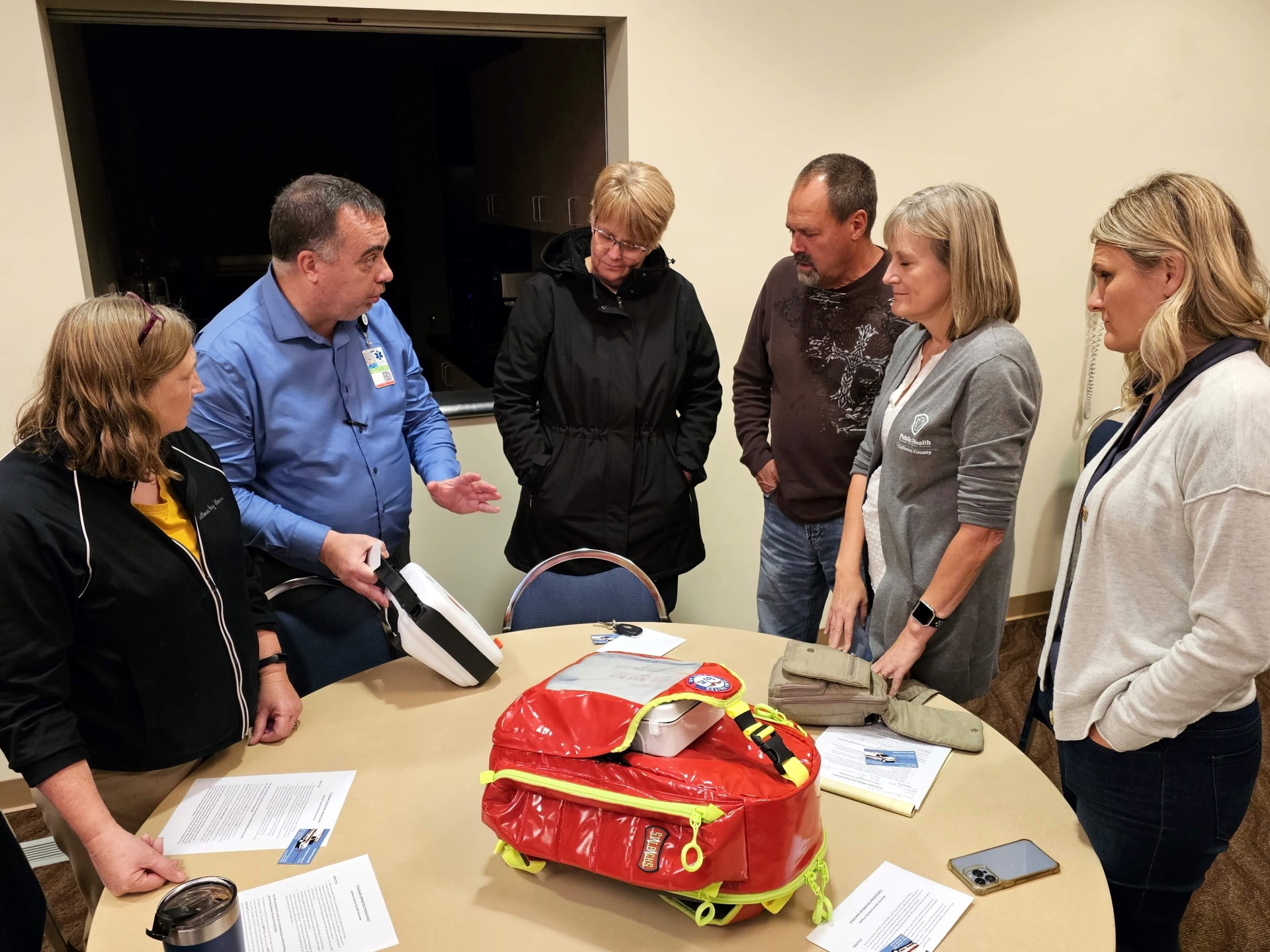
“Uber for EMS:” Calhoun County Promotes Iowa United First Aid
When the unthinkable happens—whether that’s a car crash, a farm accident, or a heart attack—minutes count. But what if an ambulance crew can’t get there fast enough?When the unthinkable happens—whether that’s a car crash, a farm accident, or a heart attack—minutes count. But what if an ambulance crew can’t get there fast enough?
“If there’s an emergency, there’s an expectation that help is coming quickly,” said Lt. Governor Adam Gregg, who spoke at the Rockwell City Public Library on Nov. 2. “Rural EMS can be a challenge, however. Average ambulance response time is 25 to 30 minutes in some areas.”
As this challenge becomes more widespread in rural Iowa, Gregg is promoting Iowa United First Aid and seeking volunteers for this innovative, new program. Calhoun County is one of three Iowa counties to participate in a pilot program for Iowa United First Aid. The mission is to provide immediate medical intervention during the critical window between the onset of an emergency and the arrival of traditional ambulance assistance.

Volunteers who sign up to be part of Iowa United First Aid will receive approximately 10 hours of CPR+ level training for free. The training will cover CPR, first aid, control-the-bleed, and use of an automated external defibrillator (AED), a sophisticated, yet easy-to-use, medical device that helps to re-establish an effective heart rhythm in people experiencing sudden cardiac arrest.
Along with trained volunteers, Iowa United First Aid will leverage GPS-location technology and smartphones to promote faster response time. “This system is like Uber, but for lifesaving,” Gregg said. “Using technology to notify the trained first-aid volunteers who are closest to the site of the emergency could really be a game changer for rural Iowa.”
Each Iowa county in the pilot project for Iowa United First Aid is receiving $75,000 (including $50,000 in state funds, plus a $25,000 match from the county) to fund the program for a year. Trained first-aid volunteers will receive a go-bag (containing basic first aid gear and an AED), valued at approximately $2,500, to use in their role with Iowa United First Aid.
Volunteers are not expected to be on call constantly. They can decline a request for assistance, if they are unavailable. In that case, dispatch will reach out to other volunteers in the region.
While Iowa United First Aid does not replace the need for EMTs, paramedics or ambulance service, trained volunteers can bridge the gap between an emergency and the time when the ambulance arrives. Early activation of 911, along with immediate CPR and first aid, can double or triple a person’s chance of survival.
Also, research has shown that the sooner CPR is started after cardiac arrest, the better the outcomes, Gregg added. Every minute that passes without CPR reduces the likelihood of survival by approximately 7% to 10%, according to CPR Select.
The idea for Iowa United First Aid took root during a trade mission to Israel in March of 2022. That’s where Gregg learned about United Hatzalah, a free, volunteer-based emergency medical services organization that serves people throughout Israel. “Hatzalah is the Hebrew word for rescue,” said Gregg, who noted that the Israeli volunteers’ average response time is 90 seconds in Jerusalem and Tel Aviv, and 3 minutes in other parts of Israel.
Gregg was incredibly inspired by the work of United Hatzalah and wondered if this system could be adapt for rural Iowa. “We have a lot in common with Israel, including an ethic of respecting and protecting God-given life,” Gregg said.
The need is great, he added. “There are lots of situations where minutes matter, whether someone is bleeding from a farm accident, suffering a heart attack or stroke, or facing an opioid overdose. These things happen every day throughout our state.”
 Along with training in basic first aid, CPR, and operating an AED, trained first-aid volunteers can also be trained to handle NARCAN®, an opioid overdose treatment. “We’re not asking for EMT-level training for Iowa United First Aid,” Gregg said. The only requirement (once volunteers are trained) is to keep current on their CRP certification every two years.
Along with training in basic first aid, CPR, and operating an AED, trained first-aid volunteers can also be trained to handle NARCAN®, an opioid overdose treatment. “We’re not asking for EMT-level training for Iowa United First Aid,” Gregg said. The only requirement (once volunteers are trained) is to keep current on their CRP certification every two years.
The team at the Calhoun County Electric Cooperative Association is interested in Iowa United First Aid. “We already have five AEDs, including one in our office in Rockwell City and four in our vehicles,” Keaton Hildreth, CEO of the Calhoun County Electric Cooperative Association. “Also, our entire employee group is trained in CRP, AED use, first aid and stop-the-bleed. It’s a natural fit to get some of our employees involved in Iowa United First Aid.”
The minimum age to participate in Iowa United First Aid is 18. Project leaders hope to get 25 to 30 volunteers who are strategically located throughout each county to participate in the pilot program.
Iowa United First Aid also creates a unique opportunity for people interested in a medical career, Gregg noted. “I think this will be a workforce pipeline for future EMTs and paramedics who will go on to serve with ambulance crews in our communities.”
Gregg thanks Calhoun County residents for being open to a new idea like Iowa United First Aid. “If you, a friend, a colleague or someone else you know is interested, get involved. This is going to be a really positive thing for our rural communities. I appreciate the entrepreneurial spirit in Calhoun County to make this work.”
More Blogs
- Dr. Julia Richardson Provides Quality Care, Close to Home
- The Nook Shake and Energy Bar Fills a Niche in Lake City
- Meet Theresa Hildreth, Calhoun County Economic Development’s New Executive Director
- Small-Format Fareway in Rockwell City Thrives
- Hardware and Hotrods: Young Entrepreneurs Help Gentry Hardware Thrive in Rockwell City
- Gov. Reynolds, Lt. Gov. Gregg announce nominations for Iowa Opportunity Zones

